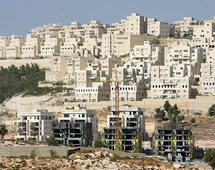
"We are disappointed, but remain focused on our long term objectives," said State Department spokesman Philip Crowley. "One way or the other the parties have to find a way to continue direct negotiations."
European leaders were unanimous in their concern at the Israeli decision, and warned that the Middle East peace talks could founder on the issue.
Britain's Foreign Secretary William Hague said he was "very disappointed" and would personally pass on his appeal to Israeli Foreign Minister Avigdor Lieberman at the UN General Assembly in New York.
At a joint news conference with Palestinian leader Mahmud Abbas, French President Nicolas Sarkozy expressed his "regret that the unanimous calls for the moratorium on Israeli settlement building to be extended were not listened to. I deplore this."
Sarkozy said the 10-month freeze "should have been extended to give negotiation a chance. I say this in front of president Abbas: 'settlement must stop'," he said.
EU foreign supremo Catherine Ashton said that as there is no alternative to a negotiated solution, "...it is in everybody's interest to find a satisfactory way for the negotiations to continue and gather momentum."
Direct Israeli-Palestinian talks resumed in September after a 20-month hiatus, under the auspices of the United States but without fellow peace Quartet members the EU, Russia and the United Nations.
Turkey's Foreign Minister Ahmet Davutoglu joined the growing international chorus against Israel, saying that its one-time ally was not showing signs that it wanted peace.
"For us, the continuation of direct negotiations is very important but in order to continue these negotiations everybody must show good intention and a political lead," Davutoglu told reporters.
Turkey was once Israel's leading majority Muslim ally in the Middle East but relations have become more tense in recent years, particularly since Israeli commandos attacked a Turkish ferry carrying humanitarian aid to Gaza on May 31.
"It is contradictory if you are continuing negotiations and continuing settlements at the same time," he said.
Jordan, which signed a 1994 peace treaty with Israel, said it was "against settlements," Information Minister Ali Ayed told a news conference.
"Building settlements in the Palestinian territories, including Jerusalem, obstructs global peace efforts led by the US administration."
Meanwhile, the United States praised the "restraint" shown by Abbas, who did not immediately quit the Middle East peace talks after Israel announced its decision.
The Palestinian president had repeatedly warned he would turn his back on the US-backed negotiations with Israel should the Jewish state continue building on occupied Palestinian land.
But Abbas told reporters in Paris he would not rush to respond to Israel's failure to extend the freeze, but would first consult Palestinian and Arab leaders.
----------------------------------------------------------------------
European leaders were unanimous in their concern at the Israeli decision, and warned that the Middle East peace talks could founder on the issue.
Britain's Foreign Secretary William Hague said he was "very disappointed" and would personally pass on his appeal to Israeli Foreign Minister Avigdor Lieberman at the UN General Assembly in New York.
At a joint news conference with Palestinian leader Mahmud Abbas, French President Nicolas Sarkozy expressed his "regret that the unanimous calls for the moratorium on Israeli settlement building to be extended were not listened to. I deplore this."
Sarkozy said the 10-month freeze "should have been extended to give negotiation a chance. I say this in front of president Abbas: 'settlement must stop'," he said.
EU foreign supremo Catherine Ashton said that as there is no alternative to a negotiated solution, "...it is in everybody's interest to find a satisfactory way for the negotiations to continue and gather momentum."
Direct Israeli-Palestinian talks resumed in September after a 20-month hiatus, under the auspices of the United States but without fellow peace Quartet members the EU, Russia and the United Nations.
Turkey's Foreign Minister Ahmet Davutoglu joined the growing international chorus against Israel, saying that its one-time ally was not showing signs that it wanted peace.
"For us, the continuation of direct negotiations is very important but in order to continue these negotiations everybody must show good intention and a political lead," Davutoglu told reporters.
Turkey was once Israel's leading majority Muslim ally in the Middle East but relations have become more tense in recent years, particularly since Israeli commandos attacked a Turkish ferry carrying humanitarian aid to Gaza on May 31.
"It is contradictory if you are continuing negotiations and continuing settlements at the same time," he said.
Jordan, which signed a 1994 peace treaty with Israel, said it was "against settlements," Information Minister Ali Ayed told a news conference.
"Building settlements in the Palestinian territories, including Jerusalem, obstructs global peace efforts led by the US administration."
Meanwhile, the United States praised the "restraint" shown by Abbas, who did not immediately quit the Middle East peace talks after Israel announced its decision.
The Palestinian president had repeatedly warned he would turn his back on the US-backed negotiations with Israel should the Jewish state continue building on occupied Palestinian land.
But Abbas told reporters in Paris he would not rush to respond to Israel's failure to extend the freeze, but would first consult Palestinian and Arab leaders.
----------------------------------------------------------------------









 Home
Home Politics
Politics









